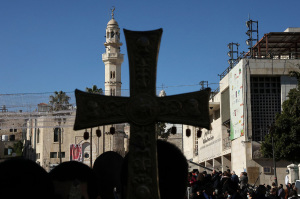Motives for Church Burnings in Indonesia Questioned
Outside Islamist groups use lack of permits as pretext for violence.
JAKARTA, Indonesia – Suspected Islamists were behind the burning of three homes used as churches on Sumatra Island’s Riau Province this month, though a political motive may also have played a role, Christian leaders said.
Muslim mobs burned the meeting places of a Batak Karo Protestant Church (GBKP) congregation and a Pentecostal Church in Indonesia (GPDI) group on Aug. 1, and that of a Methodist Church of Indonesia on Aug. 2, all in Kuantan Singingi district.
Provincial GBKP leader Sahat Tarigan reportedly said about 100 people on motorcycles arrived at the home at 11 p.m. on Aug. 1, throwing stones, threatening church members with knives and ultimately pouring gasoline and setting it on fire. A number of church members were inside painting at the time of the attack, but there were no casualties, Tarigan told Radio 68H News Agency.
The same mob also set the GPDI home on fire some five kilometers (three miles) away, he said.
“We do not know where they came from, but certainly we have no problem with local people,” he told Radio 68H. “Those who burned the churches are not residents who live around us.”
Tarigan said the home where the GBKP church meets was built about three years ago, and area resident have never objected to any worship there. He said he did not know the reason mobs set the home on fire, though Metrotvnews reported that an area Muslim said the site lacks a permit and that the singing bothers Muslims fasting by day for Ramadan.
But the executive secretary of the Communion of Churches in Indonesia, Jeirry Sumampow, said he suspected political motives. An election in April in which all churches in the Kuantan Tengah sub-district backed the winning regent may have played a role, he said.
“I regret that the church has been the victim of political in-fighting,” Sumampow told Compass.
He said those who burned the house churches were not dressed as hard-line Muslim demonstrators customarily are. He noted that the incident occurred only in the one sub-district where the churches backed the victorious candidate.
“At the time of the election there was tension, because the Christians in the sub-district openly stated their support for the candidate who is now elected,” he said.
Sumampow said he regretted that police were slow to react to the attacks of Aug. 1, which contributed to the third house church burning on Aug. 2.
The governor of Riau Province urged citizens to refrain from vigilante violence. Riau Provincial Administration spokesman Chairul Rizky said the governor ordered the regent of Kuantan Singingi to urge residents to resolve conflicts with dialogue rather than force.
Rizky said that although the house churches do not have permits, arson cannot be tolerated. Though the governor ordered police to protect church sites that have permits, this does not mean that people can attack those that do not have permits, he said.
“The governor ordered police to protect places of worship that have been permitted, and to not let anyone take the law into their own hands to solve problems,” Rizky told Radio 68H. “So, we hope this problem can be resolved in a short time, so that Christians can pray without being disturbed.”
He added that the three house churches did not have permits because their leaders sought only housing authorization, rather than church permits.
The head of Criminal Police in Kuansing, AKP Darmawan, confirmed the attacks, telling Vivanews.com the structures set on fire were not church buildings but private homes made of wood.
The vice chairman of the Setara Institute for Democracy and Peace, Bonar Tigor Naipospos, said he regretted the burning of churches during Ramadan, adding that Muslims who are fasting during the month are supposed to be able to restrain their passions.
The former chairman of the Muhammadiyah socio-economic reform movement in Indonesia, H. Ahmad Shafi Ma’arif, was furious over the church burnings.
“Only crazy people want to burn churches, and no matter what the reason, such incidents cannot be tolerated,” Ma’arif reportedly said, adding that such incidents continue to occur because law enforcement is weak.
At press time Riau Provincial Police had reportedly questioned 21 witnesses and arrested two suspects.
Church Shuttered
In West Jakarta, about 100 hard-line Muslims from the Betawi Rempug Forum (FBR) went to a three-storey shop where Maranata Bible Church meets in Jalan Kacang Tanah, Bojong Indah, on July 31 and demanded that it close because it was operating without a permit.
After meeting with the Islamist group for half an hour, church leaders agreed to stop worship services and remove the church sign until it obtains a permit, though no area residents had complained about the church.
Promising to obtain the permit from the mayor of West Jakarta immediately, Pastor Silas Kusah said he had already obtained permission from local residents for the church to operate. Area residents have never complained about the existence of the church, which has been active for three-and-a- half years, he said.
The head of the Cengkareng sub-district reportedly said the church had no permits because residents had presented no objections.
The Setara Institute’s Bonar said that as no one in the area disputed the existence of the church, there should be no problems with the processing of its application for a permit.





























